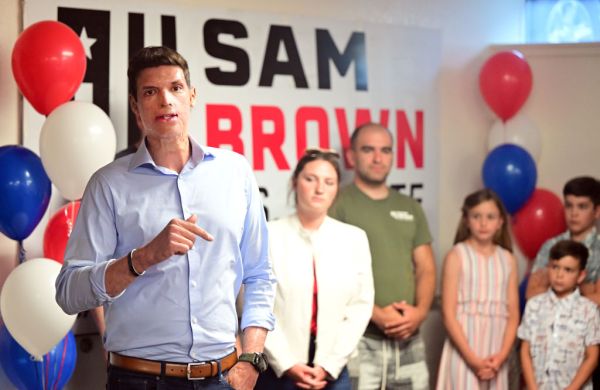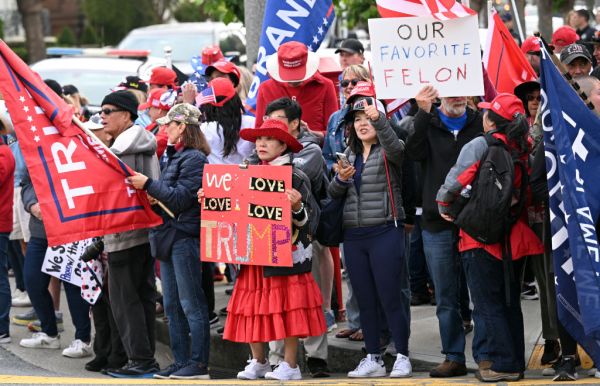Happy Friday! If you’re ever in Washington (D.C. or the state) and you need a quick repair to your car stereo, you can apparently turn to Rep. Marie Gluesenkamp Perez. Enjoy this new video of the Washington state Democrat (who’s facing a tough reelection battle) and her husband Dean fixing the radio in the car of her Republican colleague, North Carolina’s Virginia Foxx.
Up to Speed
- Former President Donald Trump met with House and Senate Republicans on Thursday. With House members, he discussed his criminal trials and abortion policy, encouraging attendees to “follow your own heart” on the latter issue, while also endorsing exceptions for rape, incest, and the life of the mother, according to CNN. In the Senate meeting, he struck a unifying tone with Minority Leader Mitch McConnell, with whom he had not spoken since December 2020. McConnell told the outlet the meeting was positive.
- Multiple reports from that meeting said Trump called Milwaukee, the host city of next month’s Republican National Convention, a “horrible city,” leaving Wisconsin Republicans scrambling to offer clarification. Rep. Bryan Steil at first denied Trump made the comments, while Rep. Derrick Van Orden said the former president was referring to crime in the city. Meanwhile, Rep. Glenn Grothman claimed Trump was referring to elections and election integrity in the city. Steil later said Trump was talking about “specific issues, not the city of Milwaukee.”
- Trump also met with Virginia Gov. Glenn Youngkin Wednesday night, a Richmond news outlet reported, to discuss Trump’s prospects of winning the state in November. Recent polling has indicated the Old Dominion is getting more competitive and Trump told House Republicans on Thursday his campaign is adding the state to its battleground map, along with New Jersey, Minnesota, and New Mexico.
- Trump and President Joe Biden’s Chief of Staff Jeff Zients met separately with powerful executives at the Business Roundtable on Thursday, Reuters reported. Attendees included JPMorgan Chase CEO Jamie Dimon and Apple CEO Tim Cook. The meetings come as the economy is set to be a major issue in the upcoming election between Trump and Biden, with polling often showing voters’ disapproval of the way Biden has handled it.
- While we’re on economics, the Federal Reserve chose not to cut interest rates Wednesday, forecasting that only one cut would be coming this year. That news came after a Department of Labor report found that inflation had slowed in May, which Fed Chair Jerome Powell called “progress” but not enough to warrant immediate cuts. As Dispatch Politics reported earlier this week, the Fed’s interest rates could have a serious impact on this fall’s election.
Newcomer to Politics, and Oklahoma, Challenges House Appropriations Chair

One of the most powerful Republicans in Congress is facing a real headache in the form of a well-funded, right-wing challenger in his deep-red district.
In the June 18 Oklahoma primary, Rep. Tom Cole, who chairs the House Appropriations Committee, is hoping to dispatch Paul Bondar, a deep-pocketed populist with few ties to the area he would represent. In a race with little reliable public polling, Cole is likely to win, but he is also taking seriously the challenge from Bondar, who has loaned over $5 million to his campaign for the 4th Congressional District.
Bondar is using this war chest chiefly to attack Cole on his recent votes in favor of reauthorizing a provision of the Foreign Intelligence Surveillance Act and aid to Ukraine. Meanwhile, Cole’s main line of attack against Bondar has been based on the challenger’s tenuous and recent connections to the district, which encompasses most of south-central Oklahoma.
“It's a pretty unusual race; most expensive race I've ever been involved in,” Cole told Dispatch Politics. “But, again, we feel comfortable about where we're at. We’ve run, I think, a good campaign, and it's not like I'm a stranger to this district.”
The 75-year-old Cole, whom former President Donald Trump has endorsed, has represented the district for 11 terms and has a long history of involvement in Republican politics. He served as the chair of the Oklahoma GOP in the 1980s and executive director of the National Republican Congressional Committee in the 1992 election cycle. He is perhaps the most experienced Republican in Congress to face a formidable primary challenge from his right flank this year.
So far this cycle, Republican primary challengers running to the right of incumbents have not been successful, but they have made races for some sitting members too close for comfort. Texas Rep. Tony Gonzales last month fended off by only 400 votes a challenge from a YouTuber and firearm manufacturer whom multiple members of Congress endorsed after Gonzales voted for a gun control package that President Joe Biden backed. Earlier this month, Iowa Reps. Mariannette Miller-Meeks and Randy Feenstra defeated their challengers by 12 points and 20 points, respectively—but the margins were closer than expected.
Bondar is trying to ride a similar anti-incumbent sentiment.
“Our citizens are insulted by the level of betrayal they feel from our representatives,” he told Dispatch Politics. “They're insulted because they think that people in D.C. are treating people in Oklahoma like they're fools and they're not able to put one plus one together. And they see that these policies are not working for the benefit of Oklahomans and for Americans in general.”
Bondar grew up in Wisconsin and ran an insurance business in Illinois before moving to Texas in 2021, where he voted in the state’s March GOP primary. Bondar bought a patch of land in Oklahoma that is not in the district—he made the $5 million purchase in 2022, he told Dispatch Politics—where he is building a “forever home” for his family. He added that he is living in a rental in Stonewall, Oklahoma, which is in the district, during the construction. But during a remote interview last month with an Oklahoma City TV station, Bondar said he was speaking from his office, then acknowledged that he was not in Oklahoma at the time. (He later told Dispatch Politics the interview was a “set-up.”)
Cole, who was born in Louisiana but spent nearly his entire life in Oklahoma, is a member of the Chickasaw Nation and comes from a long line of Sooner State natives. The incumbent is taking full advantage of Bondar’s residency issues.
“His problem is he's not really an Oklahoman. He's posing to be something that he's not. He’s a Texan,” Cole told Dispatch Politics.
Asked what his connections are to the people he would represent, Bondar responded: “My conservative values—the fact that I'm going to have their back instead of stab them in the back, and that's enough. That's all it takes.” When Dispatch Politics asked him when he moved into his temporary rental, he declined to name a specific month, saying it was when he “made the commitment to running in this campaign.” He pointed out that he is only required to live in the state at the time he is elected.
“I could be running from Hawaii, if I want to,” he said. “So I'm so tired of [Cole] talking about this nonsense instead of his complete, corrupt failure and stabbing the people in the back and this distraction. I don't need to live in Oklahoma, period. I chose to buy $5 million of real estate and make this a significant stakehold. And because I've done that, I want to clean it up.”
Bondar also attacked Cole for the outside money spent in the primary in the incumbent’s favor. Americans 4 Security, a super PAC backing Cole, will likely spend $4 million to support his election. The group has already run ads hitting Bondar for his Texas ties.
The incumbent is receiving “millions of dollars being pumped in from these dirty money D.C. groups, and he says I'm trying to buy the election,” Bondar said. “Let's get things straight here. I think if we can get people just to think about it for a second, it's pretty clear what's going on.”
In response, Cole continued to emphasize Bondar’s lack of history in Oklahoma.
“If we're talking about outside dollars, I can make an argument that all of his dollars are outside dollars,” Cole said. “They weren't made in Oklahoma, and so they’re either from Texas or Illinois or Wisconsin or someplace.”
A Revealing Interview With Ohio’s Junior Senator
One of the leading contenders to become Donald Trump’s running mate is Ohio Sen. J.D. Vance, the author of the bestselling memoir Hillbilly Elegy who was elected in 2022. Born of the same white working class that forms the backbone of Trump’s base in the Midwest, Vance is a Marine Corps veteran, a graduate of Yale Law School, and a former tech venture capitalist.
But the 39-year-old is now arguably the most coherent intellectual voice for the economic and cultural populism undergirding Trump’s MAGA movement. That much is evident from Vance’s interview this week with Ross Douthat, the New York Times columnist. In their conversation, Vance lays out his economic vision for the country, which includes a sharp critique of the (small-l) liberal economic order:
… The main thrust of the postwar American order of globalization has involved relying more and more on cheaper labor. The trade issue and the immigration issue are two sides of the same coin: The trade issue is cheaper labor overseas; the immigration issue is cheaper labor at home, which applies upward pressure on a whole host of services, from hospital services to housing and so forth.
The populist vision, at least as it exists in my head, is an inversion of that: applying as much upward pressure on wages and as much downward pressure on the services that the people use as possible. We’ve had far too little innovation over the last 40 years, and far too much labor substitution. This is why I think the economics profession is fundamentally wrong about both immigration and about tariffs. Yes, tariffs can apply upward pricing pressure on various things — though I think it’s massively overstated — but when you are forced to do more with your domestic labor force, you have all of these positive dynamic effects.
It’s a classic formulation: You raise the minimum wage to $20 an hour, and you will sometimes hear libertarians say this is a bad thing. “Well, isn’t McDonald’s just going to replace some of the workers with kiosks?” That’s a good thing, because then the workers who are still there are going to make higher wages; the kiosks will perform a useful function; and that’s the kind of rising tide that actually lifts all boats. What is not good is you replace the McDonald’s worker from Middletown, Ohio, who makes $17 an hour with an immigrant who makes $15 an hour. And that is, I think, the main thrust of elite liberalism, whether people acknowledge it or not.
Among the positions Vance reinforces in the interview are his support for tariffs as both a tool of economic protection and a source of revenue; his opposition to introducing private-market elements to Social Security; and his preferred “realist” approach to foreign policy that deemphasizes what he calls the “moralism” of the establishment. The Ohio Republican offers a fairly coherent worldview that dispenses with much of the traditional conservative policy assumptions in favor of a full-spectrum populist, MAGA agenda.
But when Douthat asks Vance about the other and perhaps most important tenet of Trumpism in 2024—the belief that the 2020 presidential election was stolen—the senator provides a politically salable but less intellectually coherent response. Vance argues that 2020 was “stolen” by various means, from the changes to voting rules in certain states due to COVID-19 restrictions to the suppression of stories harmful to Joe Biden by news and social media institutions. And he goes on to say that even voicing these criticisms of the 2020 election makes one a target for elites.
“I think the election in 1960 was stolen. The election of 2000 had some issues. I think that challenging elections and questioning the legitimacy of elections is actually part of the democratic process,” Vance says. “When Trump says the election was stolen, and people say he was wrong, I say, ‘Fine, we can argue about that.’ When they say, ‘He’s threatening the foundation of American society,’ I can’t help but roll my eyes.”
But Douthat presses Vance on Trump’s attempts to alter the outcome, all of which led to the raid on the Capitol on January 6, 2021. The conservative columnist asks if it made “any sense” for Trump to demand that his vice president, Mike Pence, should have stopped the counting of electoral votes and “returned” the election to the states where Republicans were disputing the outcome. Pence insisted at the time and since that he had no authority to do so. Vance, apparently, disagrees.
“The vice-presidential thing—look, here’s what this would’ve looked like if you really wanted to do this,” he said. “You would’ve actually tried to go to the states that had problems; you would try to marshal alternative slates of electors, like they did in the election of 1876. And then you have to actually prosecute that case; you have to make an argument to the American people.”
Vance then acknowledges that the process of allowing for “alternative” slates of electors in states Biden won would not have changed the ultimate outcome. “Do I think Joe Biden would still be president right now? Yeah, probably. But at least we would have had a debate,” he said.
He insists that a far more serious constitutional crisis than January 6 was the refusal of military leaders and other bureaucratic elements of the executive branch to follow Trump’s orders during his presidency, prompting this revealing exchange between Douthat (in italics) and Vance:
Why can’t it be both? Why can’t you say, “It was wrong the way the military and the administrative state behaved under Trump, and it also would’ve been a really, really bad idea for Mike Pence to intervene on Jan. 6”?
If the conservative response to this is to say “both sides are bad,” and the liberal response to this is to say “it’s fine when my side does it, and it’s bad when the other side does it,” the liberals will always win the argument in this country. I really don’t believe this is about some deep principle; this is about power.
Be sure to read the entire interview.
Notable and Quotable
“Why would she endorse this dope? He doesn’t know how to get off a stage.”
—Former President Donald Trump, saying pop superstar Taylor Swift shouldn’t endorse President Joe Biden, in his meeting with House Republicans, per CNN, June 13, 2024







Please note that we at The Dispatch hold ourselves, our work, and our commenters to a higher standard than other places on the internet. We welcome comments that foster genuine debate or discussion—including comments critical of us or our work—but responses that include ad hominem attacks on fellow Dispatch members or are intended to stoke fear and anger may be moderated.
With your membership, you only have the ability to comment on The Morning Dispatch articles. Consider upgrading to join the conversation everywhere.